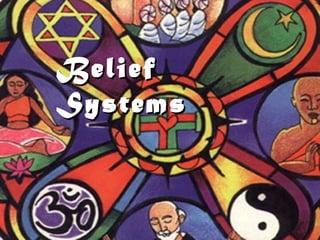This document provides an overview of several major belief systems including animism, Hinduism, Buddhism, Judaism, Christianity, and Islam. It describes the origins, key beliefs, sacred texts, and spread of each religion. It also discusses how religions can be similar in concepts like karma and dharma, but differ in other beliefs like views on gods and the afterlife. The document aims to help readers understand and compare characteristics of major world religions.


































